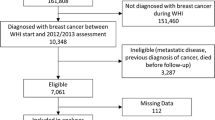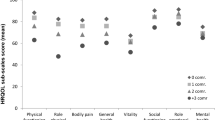Abstract
Greater chronic disease burden may decrease quality of life (QOL) of breast cancer survivors. Our objective was to investigate the association between chronic disease burden and QOL in breast cancer survivors at 1 year post-diagnosis. We analyzed cross-sectional data collected 1 year post-diagnosis from a sample of female breast cancer survivors identified from the Missouri cancer registry. We used eight RAND-36 subscales to assess physical, emotional, and social functioning QOL domains. Using Katz’s measure of comorbidity, we computed chronic disease burden (0, 1, and 2+). Multivariable general linear models for each QOL subscale were used to examine associations between chronic disease burden and QOL after controlling for potential covariates: socio-demographic, clinical, psychosocial, behavioral risk factors, and access to medical care. Participants (n = 1089) were 58-year old on average (range 27–96) and mostly White (92%), married (68%), had at least a high school education (95%), and had health insurance (97%). Sixty-six percent of survivors had a chronic disease burden score of 0, 17% had 1, and 17% had 2+. Chronic disease burden was significantly associated with each QOL subscale in crude models (P < 0.001). In fully adjusted models, chronic disease burden was still significantly correlated with six subscales, but not with the emotional well-being and role limitations due to emotional problems subscales. One year post-diagnosis, breast cancer survivors with higher chronic disease burden had lower physical and social functioning than survivors without additional health conditions. These differences were not fully explained by relevant covariates. Identifying modifiable targets for intervention will be critical for improving QOL outcomes among survivors who have other chronic health conditions.

Similar content being viewed by others
References
Altekruse SF, Kosary CL, Krapcho M, Neyman N, Aminou R, Waldron W, Ruhl J, Howlader N, Tatalovich Z, Cho H, Mariotto A, Eisner MP, Lewis DR, Cronin K, Chen HS, Feuer EJ, Stinchcomb DG, Edwards BK (2010) SEER Cancer Statistics Review, 1975–2007. National Cancer Institute. http://seer.cancer.gov/csr/1975_2007/. Accessed July 15 2010
Ramsey S, Andersen M, Etzioni R, Moinpour C, Peacock S, Potosky AL (2000) Quality of life in survivors of colorectal carcinoma. Cancer 88(6):1294–1303
Cella DF, Cherin EA (1988) Quality of life during and after cancer treatment. Compr Ther 14:69–75
Ganz PA, Hirji K, Sim MS, Coscarellis Schag CA, Fred C, Polinsky ML (1993) Predicting psychosocial risk in patients with breast cancer. Med Care 31:419–431
Shimozuma K, Ganz PA, Petersen L, Hirji K (1999) Quality of life in the first year after breast cancer surgery: rehabilitation needs and patterns of recovery. Breast Cancer Res Treat 56:45–57
Smith AW, Reeve BB, Bellizzi KM, Harlan LC, Klabunde CN, Amsellem M, Bierman AS, Hays RD (2008) Cancer, comorbidities, and health-related quality of life of older adults. Health Care Financ Rev 29(4):41–56
Reeve BB, Potosky AL, Smith AW, Han PK, Hays RD, Davis WW, Arora NK, Haffer SC, Clauser SB (2009) Impact of cancer on health-related quality of life of older Americans. J Natl Cancer Inst 101(12):860–868
Lazovich D, Robien K, Cutler G, Virnig B, Sweeney C (2009) Quality of life in a prospective cohort of elderly women with and without cancer. Cancer 115(18 Suppl):4283–4297
Stein KD, Syrjala KL, Andrykowski MA (2008) Physical and psychological long-term and late effects of cancer. Cancer 112(Suppl 11):2577–2592
Michael YL, Kawachi I, Berkman LF, Holmes MD, Colditz GA (2000) The persistent impact of breast carcinoma on functional health status. Cancer 89(11):2176–2186
Baker F, Haffer SC, Denniston M (2003) Health-related quality of life of cancer and noncancer patients in Medicare managed care. Cancer 97(3):674–681
Ganz PA, Guadagnoli E, Landrum MB, Lash TL, Rakowski W, Silliman RA (2003) Breast cancer in older women: quality of life and psychosocial adjustment in the 15 months after diagnosis. J Clin Oncol 21(21):4027–4033
Engel J, Kerr J, Schlesinger-Raab A, Eckel R, Sauer H, Holzel D (2003) Comparison of breast and rectal cancer patients’ quality of life: results of a four year prospective field study. Eur J Cancer Care (Engl) 12(3):215–223
Vacek PM, Winstead-Fry P, Secker-Walker RH, Hooper GJ, Plante DA (2003) Factors influencing quality of life in breast cancer survivors. Qual Life Res 12(5):527–537
Garman KS, Pieper CF, Seo P, Cohen HJ (2003) Function in elderly cancer survivors depends on comorbidities. J Gerontol A Biol Sci Med Sci 58(11):1119–1124
Janz NK, Mujahid M, Chung LK, Lantz PM, Hawley ST, Morrow M, Schwartz K, Katz SJ (2007) Symptom experience and quality of life of women following breast cancer treatment. J Womens Health 16(9):1348–1361
Ahmed RL, Prizment DL, Schmitz KH, Folsom AR (2008) Lymphedema and quality of life in breast cancer survivors: the Iowa Women’s Health Study. J Clin Oncol 26(35):5689–5696
Bowen D, Alfano C, McGregor B, Kuniyuki A, Bernstein L, Meeske K, Baumgartner K, Fetherolf J, Reeve B, Smith A, Ganz P, McTiernan A, Barbash R (2007) Possible socioeconomic and ethnic disparities in quality of life in a cohort of breast cancer survivors. Breast Cancer Res Treat 106:85–95
Ashing-Giwa KT, Lim JW (2009) Examining the impact of socioeconomic status and socioecologic stress on physical and mental health quality of life among breast cancer survivors. Oncol Nurs Forum 36(1):79–88
Wedding U, Röhrig B, Klippstein A, Pientka L, Höffken K (2007) Age, severe comorbidity and functional impairment independently contribute to poor survival in cancer patients. J Cancer Res Clin Oncol 133(12):945–950
Extermann M, Hurria A (2007) Comprehensive geriatric assessment for older patients with cancer. J Clin Oncol 25(14):1824–1831
Piccirillo JF, Tierney RM, Costas I, Grove L, Spitznagel EL Jr (2004) Prognostic importance of comorbidity in a hospital-based cancer registry. JAMA 291(20):2441–2447
Yancik R, Wesley MN, Ries LAG, Havlik RJ, Edwards BK, Yates JW (2001) Effect of age and comorbidity in postmenopausal breast cancer patients aged 55 years and older. JAMA 285(7):885–892
Katzman R, Brown T, Fuld P, Peck A, Schechter R, Schimmel H (1983) Validation of a short Orientation-Memory-Concentration test of cognitive impairment. Am J Psychiatry 140(6):734–739
Hays RD, Sherbourne CD, Mazel RM (1993) The RAND 36-item health survey 1.0. Health Econ 2:217–227
Ware JE, Sherbourne CD (1992) The MOS 36-Item Short-Form Health Survey (SF-36). Med Care 30:473–483
Katz JN, Chang LC, Sangha O, Fosse IAH, Bates DW (1996) Can comorbidity be measured by questionnaire rather than medical record review? Med Care 34(1):73–84
Chen X, Zheng Y, Zheng W, Gu K, Chen Z, Lu W, Shu XO (2009) The effect of regular exercise on quality of life among breast cancer survivors. Am J Epidemiol 170(7):854–862
Coups EJ, Ostroff JS (2005) A population-based estimate of the prevalence of behavioral risk factors among adult cancer survivors and noncancer controls. Prev Med 40(6):702–711
Ness KK, Wall MM, Oakes JM, Robison LL, Gurney JG (2006) Physical performance limitations and participation restrictions among cancer survivors: a population-based study. Ann Epidemiol 16(3):197–205
Sweeney C, Schmitz KH, Lazovich D, Virnig BA, Wallace RB, Folsom AR (2006) Functional limitations in elderly female cancer survivors. J Natl Cancer Inst 98(8):521–529
Hewitt M, Rowland JH, Yancik R (2003) Cancer survivors in the United States: age, health, and disability. J Gerontol 58(1):82–91
Schag CA, Ganz PA, Polinsky ML, Fred C, Hirji K, Petersen L (1993) Characteristics of women at risk for psychosocial distress in the year after breast cancer. J Clin Oncol 11:783–793
Collins KK, Liu Y, Schootman M, Aft R, Yan Y, Dean G, Eilers M, Jeffe DB (2010) Effects of breast cancer surgery and surgical side effects on body image over time. Breast Cancer Res Treat 126(1):167–176
Schootman M, Jeffe D, West M, Aft RL (2005) Comparison of self-reported breast cancer treatment and medical records among older women. J Clin Epidemiol 58:1316–1319
Cohen S, Kamarck T, Mermelstein R (1983) A global measure of perceived stress. J Health Soc Behav 24(4):385–396
Sherbourne C, Stewart A (1991) The MOS social support survey. Soc Sci Med 32:705–714
Kohout FJ, Berkman LF, Evans DA, Cornoni-Huntley J (1993) Two shorter forms of the CES-D (Center for Epidemiological Studies Depression) depression symptoms index. J Aging Health 5(2):179–193
Castellino SM, Casillas J, Hudson MM, Mertens AC, Whitton J, Brooks SL, Zeltzer LK, Ablin A, Castleberry R, Hobbie W, Kaste S, Robison LL, Oeffinger KC (2005) Minority adult survivors of childhood cancer: a comparison of long-term outcomes, health care utilization, and health-related behaviors from the Childhood Cancer Survivor Study. J Clin Oncol 23(27):6499–6507
Kurtz ME, Kurtz JC, Stommel M, Given CW, Given B (1999) The influence of symptoms, age, comorbidity and cancer site on physical functioning and mental health of geriatric women patients. Women Health 29(3):1–12
Wedding U, Röhrig B, Klippstein A, Brix C, Pientka L, Höffken K (2007) Co-morbidity and functional deficits independently contribute to quality of life before chemotherapy in elderly cancer patients. Support Care Cancer 15(9):1097–1104
Hays RD, Farivar SS, Liu H (2004) Approaches and recommendations for estimating minimally important differences for health-related quality of life measures. COPD 2(1):63–67
Grov EK, Fosså SD, Dahl AA (2009) Is somatic comorbidity associated with more somatic symptoms, mental distress, or unhealthy lifestyle in elderly cancer survivors? J Cancer Surviv 3:109–116
Bayliss EA, Ellis JL, Steiner JF (2005) Subjective assessments of comorbidity correlate with quality of life health outcomes: initial validation of a comorbidity assessment instrument. Health Qual Life Outcomes 3:51
Acknowledgments
This research was supported in part by grants from the National Cancer Institute (CA112159, CA91842). The funders did not have any role in the design of the study; the analysis and interpretation of the data; the decision to submit the manuscript for publication; or the writing of the manuscript. We thank Dr. Jeannette Jackson-Thompson and the staff of the Missouri Cancer Registry at the University of Missouri-Columbia for data collection; the Alvin J. Siteman Cancer Center at Barnes-Jewish Hospital and Washington University School of Medicine in St. Louis, Missouri, for the use of the Health Behavior, Communication, and Outreach Core; and Drs. Amy McQueen and Sandi Pruitt for review and comments on early versions of this manuscript.
Conflict of interest
All authors of this manuscript have no commercial associations that might pose a conflict of interest in connection with the submitted article. All funding sources supporting the work and all institutional or corporate affiliations of the authors are acknowledged at the end of the text.
Author information
Authors and Affiliations
Corresponding author
Rights and permissions
About this article
Cite this article
Deshpande, A.D., Sefko, J.A., Jeffe, D.B. et al. The association between chronic disease burden and quality of life among breast cancer survivors in Missouri. Breast Cancer Res Treat 129, 877–886 (2011). https://doi.org/10.1007/s10549-011-1525-z
Received:
Accepted:
Published:
Issue Date:
DOI: https://doi.org/10.1007/s10549-011-1525-z




